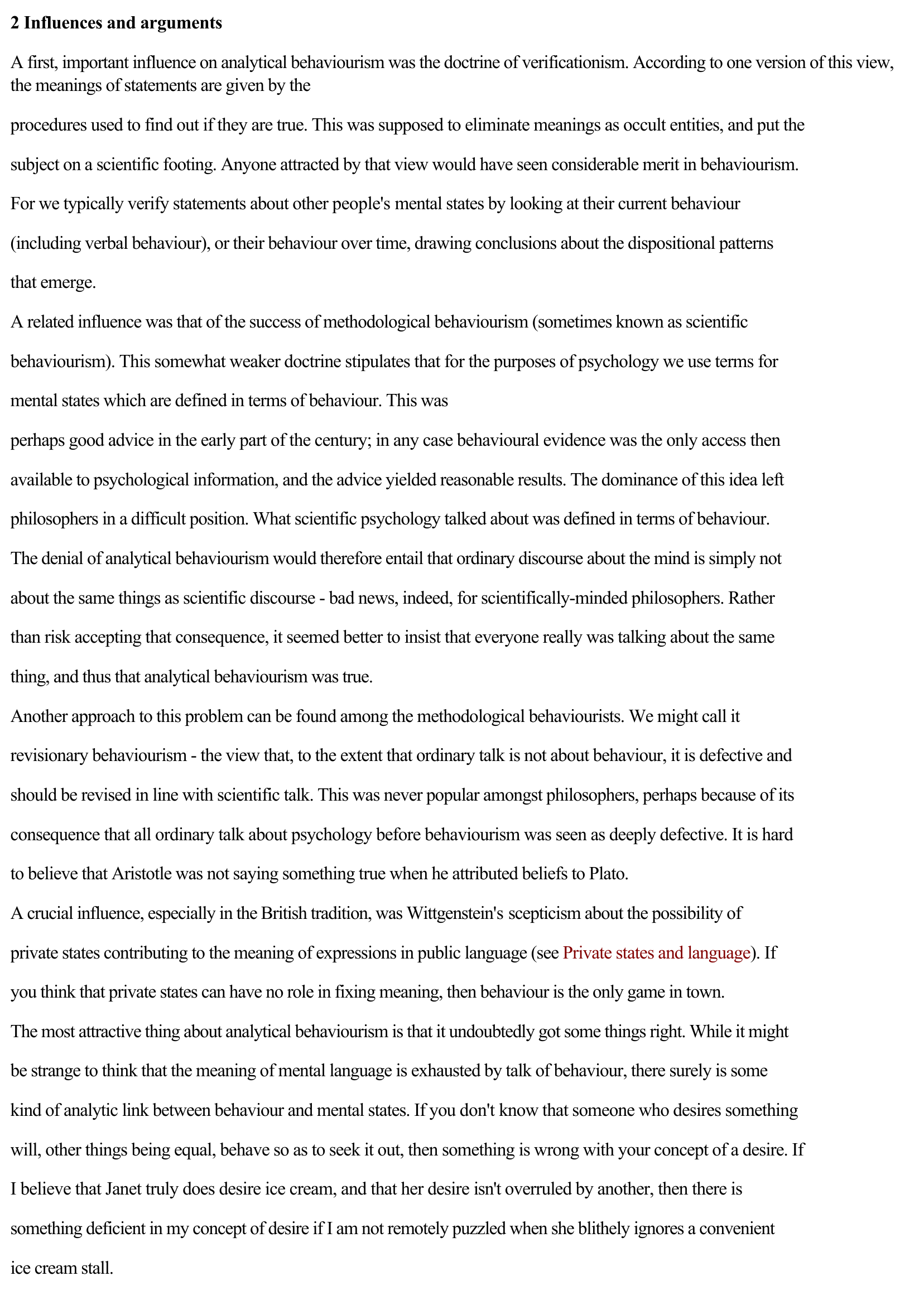Behaviourism, analytic
Publié le 22/02/2012
Extrait du document
«
2 Influences and arguments
A first, important influence on analytical behaviourism was the doctrine of verificationism.
According to one version of this view,the meanings of statements are given by the
procedures used to find out if they are true.
This was supposed to eliminate meanings as occult entities, and put the
subject on a scientific footing.
Anyone attracted by that view would have seen considerable merit in behaviourism.
For we typically verify statements about other people's mental states by looking at their current behaviour
(including verbal behaviour), or their behaviour over time, drawing conclusions about the dispositional patterns
that emerge.
A related influence was that of the success of methodological behaviourism (sometimes known as scientific
behaviourism).
This somewhat weaker doctrine stipulates that for the purposes of psychology we use terms for
mental states which are defined in terms of behaviour.
This was
perhaps good advice in the early part of the century; in any case behavioural evidence was the only access then
available to psychological information, and the advice yielded reasonable results.
The dominance of this idea left
philosophers in a difficult position.
What scientific psychology talked about was defined in terms of behaviour.
The denial of analytical behaviourism would therefore entail that ordinary discourse about the mind is simply not
about the same things as scientific discourse - bad news, indeed, for scientifically-minded philosophers.
Rather
than risk accepting that consequence, it seemed better to insist that everyone really was talking about the same
thing, and thus that analytical behaviourism was true.
Another approach to this problem can be found among the methodological behaviourists.
We might call it
revisionary behaviourism - the view that, to the extent that ordinary talk is not about behaviour, it is defective and
should be revised in line with scientific talk.
This was never popular amongst philosophers, perhaps because of its
consequence that all ordinary talk about psychology before behaviourism was seen as deeply defective.
It is hard
to believe that Aristotle was not saying something true when he attributed beliefs to Plato.
A crucial influence, especially in the British tradition, was Wittgenstein 's scepticism about the possibility of
private states contributing to the meaning of expressions in public language (see Private states and language ).
If
you think that private states can have no role in fixing meaning, then behaviour is the only game in town.
The most attractive thing about analytical behaviourism is that it undoubtedly got some things right.
While it might
be strange to think that the meaning of mental language is exhausted by talk of behaviour, there surely is some
kind of analytic link between behaviour and mental states.
If you don't know that someone who desires something
will, other things being equal, behave so as to seek it out, then something is wrong with your concept of a desire.
If
I believe that Janet truly does desire ice cream, and that her desire isn't overruled by another, then there is
something deficient in my concept of desire if I am not remotely puzzled when she blithely ignores a convenient
ice cream stall..
»
↓↓↓ APERÇU DU DOCUMENT ↓↓↓
Liens utiles
- Behaviourism in the social sciences
- Analytic ethics
- THE TRANSCENDENTAL ANALYTIC: THE SYSTEM OF PRINCIPLES - KANT
- THE TRANSCENDENTAL ANALYTIC: THE DEDUCTION OF THE CATEGORIES -KANT
- ANALYSE, ANALYTIQUE (Analysis, Analytic)

































